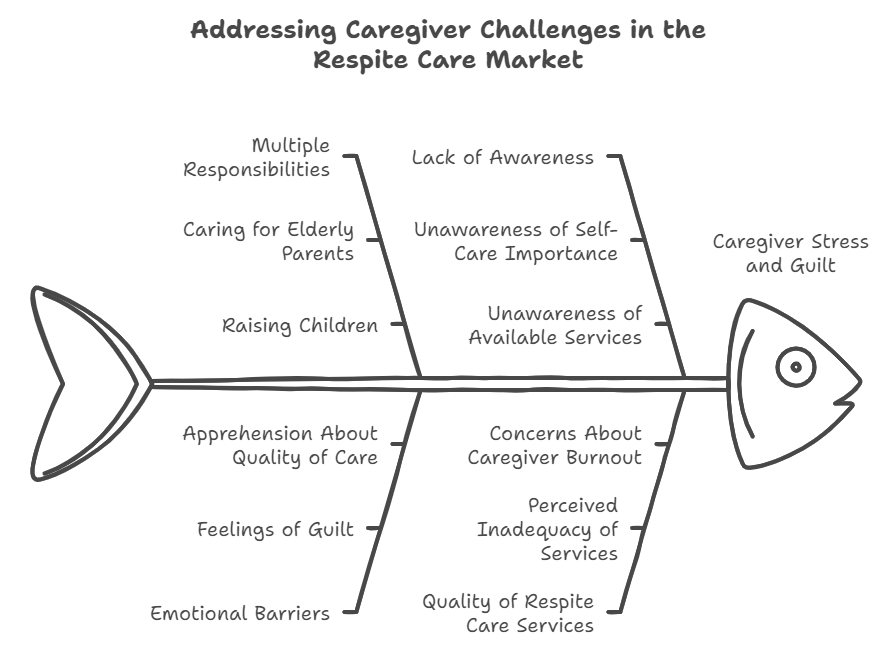Effectively promoting respite care services for seniors hinges on a profound understanding of the challenges faced by caregivers. Specifically, those belonging to the Sandwich Generation—individuals simultaneously caring for their aging parents and their children—often experience significant stress and burnout. These caregivers urgently need relief, yet they may feel guilt or anxiety about entrusting their loved ones to others. We can alleviate these concerns by emphasizing the compassionate and professional care provided and presenting our services as an essential support system. The question remains: how can we best communicate this understanding and care to them?
Understanding the Respite Care Market
Understanding the respite care market requires a comprehensive examination of the challenges Sandwich Generation caregivers face. These individuals are often overwhelmed by multiple responsibilities, including caring for elderly parents, maintaining their careers, and raising their children. This balancing act can lead to significant stress and guilt as they strive to provide adequate care for all family members.


Respite care offers a critical reprieve for these caregivers, providing temporary relief that allows them to rest and rejuvenate. However, barriers such as feelings of guilt and apprehension about leaving loved ones in the care of others often prevent caregivers from seeking this assistance. Addressing these concerns is essential to ensure caregivers receive the support they need.
It is imperative to communicate the benefits of respite care sensitively and effectively. Emphasizing the importance of self-care for caregivers is crucial, as neglecting their well-being can lead to caregiver burnout, ultimately affecting the quality of care they provide. Additionally, highlighting the comprehensive services and support offered by respite care facilities can reassure caregivers about the quality of care their loved ones will receive, thereby reducing feelings of guilt. By presenting respite care as a practical and compassionate option, we can encourage caregivers to consider it as a viable solution.
Building Trust With Senior Clients
Establishing a strong foundation of trust with senior clients is essential. When they entrust us with their care, they expect kindness, competence, and reliability. This trust is the cornerstone of our respite care services, especially for seniors transitioning into assisted living environments.

Here’s a quick snapshot of the essentials we focus on, why they matter, and our approach to fulfilling them:
| Key Factor | Its Significance | Our Approach |
|---|---|---|
| Caring with Compassion | Seniors need to feel valued | We offer tailored care, dedicating time and attention to each client |
| Open Communication | Transparency builds trust | We inform family members about their senior’s situation, promptly addressing concerns. |
| Skilled Staff | Expertise encourages confidence | Our team has extensive training and experience in elderly care |
| Dependable Service | Consistency is vital | We maintain our services without interruptions, ensuring reliability |
| Integrated Approach | Holistic care meets all needs | We consider physical, emotional, and social needs in our care plans |
Utilizing Social Media Effectively
We actively leverage social media platforms to connect with our audience, aiming to create engaging and shareable content that extends our reach. Our primary focus is on serving seniors and their families, who depend on our respite care services. Social media allows us to disseminate valuable information, foster community engagement, and initiate meaningful dialogues.

Here are strategies we employ to maximize our social media presence:
- Hosting special events such as live Q&A sessions, webinars, and virtual facility tours to engage and inform our audience.
- Promptly responding to comments, messages, and inquiries to maintain open communication and demonstrate our commitment to client care.
- Utilizing targeted advertisements and collaborating with relevant influencers to extend our reach to those needing our services.
Implementing SEO for Increased Visibility
We employ comprehensive Search Engine Optimization (SEO) strategies to enhance our online visibility and connect with seniors needing respite care services. By identifying relevant keywords and optimizing our website content, we aim to improve our search engine rankings, making it easier for individuals to find our services. This approach is crucial in effectively marketing respite care to the elderly and their caregivers.

Creating high-quality, valuable content—including blog posts and frequently asked questions—allows us to attract organic traffic and enhance our online presence. This not only improves visibility but also provides essential resources for individuals seeking care services.
Optimizing our website’s technical aspects—such as site structure, meta tags, and image alt text—enhances search engine crawlability and improves our search rankings. Additionally, acquiring backlinks from reputable healthcare and senior care organizations bolsters our website’s authority and visibility.
We also implement local SEO strategies by optimizing our Google My Business profile and encouraging client reviews. This enhances our visibility in specific geographic locations, ensuring we reach seniors who require our services in their communities. With a comprehensive set of SEO tactics, we are confident in the positive impact on our outreach and service provision.
Hosting Informative Webinars and Seminars
We are pleased to announce a series of informative webinars and seminars designed to strengthen our connection with seniors and their caregivers. These events, both virtual and in-person, will provide valuable insights into our respite care services, allowing participants to learn, ask questions, and share experiences.

Our goal is to empower you with knowledge, enabling you to make informed decisions regarding respite care for your loved ones. The webinars and seminars will feature:
- Comprehensive discussions of our services, tailored to meet individual needs.
- Real-life case studies illustrating the practical benefits of respite care.
- Interactive Q&A sessions with experienced caregivers and healthcare professionals who understand your challenges.
Please watch for invitations to these sessions in your email. We look forward to assisting you and believe these events will be valuable resources. With the right information and understanding, you can find the most appropriate respite care services for your family members.
Frequently Asked Questions
What Are the Disadvantages of Respite Care?
While respite care offers significant benefits, there are potential disadvantages to consider:
- Resistance from the elderly: Some seniors may be reluctant to accept care from unfamiliar individuals.
- Difficulty finding suitable providers: Locating qualified and trustworthy respite care providers can be challenging.
- Financial costs: Respite care services may impose financial burdens on families, depending on insurance coverage and service fees.
- Emotional stress: Transitioning care can be stressful for both caregivers and care recipients.
- Limited availability: In certain regions, respite care services may be limited or unavailable.
Why Is Respite Care Important for Caregivers?
Respite care is vital for caregivers as it provides them with necessary breaks to reduce stress and prevent burnout. By allowing caregivers time to rest and attend to their own needs, respite care helps maintain their physical and emotional well-being. This support enables caregivers to continue providing high-quality care to their loved ones without experiencing excessive strain.
How Long Has Respite Care Been Around?
Respite care, as an organized service, has evolved over the past several decades. In the United States, it gained prominence in the 1970s and 1980s as awareness of caregiver needs increased. Programs and policies were developed to support caregivers, recognizing the crucial role respite care plays in the healthcare continuum.



